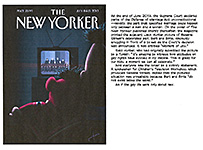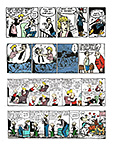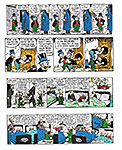|
Verging
Into Parody
GETTING THE
RECORD STRAIGHT. OR CAN WE?
Mutt and
Jeff Aren’t Gay, Are They?
Now that Bert
and Ernie have been outed, it’s high time we turn a gimlet eye on Mutt and
Jeff.  Theirs is a pretty suspicious team-up, if you ask me. (That isn’t really “me”
talking. This essay is just a parody, a mockery of the sort of intrusive
usually misbegotten scrutiny that celebrities have been subjected to for
decades. It proves nothing except that the homophobes doing the scrutining are
obsessive. To subject Bud Fisher’s iconic comic strip characters to the
kind of examination committed herewith is intended to demonstrate how easy it
is to do a speculation of this kind. Although in the case of Mutt and Jeff, we
don’t have to work too hard to achieve the somewhat self-fulfilling prophecy
pitfall into which such scrutinizing often lurches. Now, back to our story, in
progress.) Theirs is a pretty suspicious team-up, if you ask me. (That isn’t really “me”
talking. This essay is just a parody, a mockery of the sort of intrusive
usually misbegotten scrutiny that celebrities have been subjected to for
decades. It proves nothing except that the homophobes doing the scrutining are
obsessive. To subject Bud Fisher’s iconic comic strip characters to the
kind of examination committed herewith is intended to demonstrate how easy it
is to do a speculation of this kind. Although in the case of Mutt and Jeff, we
don’t have to work too hard to achieve the somewhat self-fulfilling prophecy
pitfall into which such scrutinizing often lurches. Now, back to our story, in
progress.)
I’ve
been watching reprints of this venerable comic strip—the first of its breed—for
some years at GoComics.com. And I must confess the sexual orientation of the
title characters is confusing.
As
you may recall (if you read Harv’s Hindsight for November 2007,
which is all about Mutt and Jeff and Bud Fisher, the cartoonist who invented
the dubious duo), the strip began on November 15, 1907 under the title A.
Mutt.
Mutt was short for “muttonhead” (a fool) who was mad for
playing the horses. To place a bet, he even stole from his son’s piggy bank.
At
the end of March 1908, Mutt meets Jeff, an inmate of the local insane asylum
where he imagines he’s James Jeffries, then the retired undefeated heavyweight
champion of the boxing world. For several months thereafter, Jeff was only a
transient through the strip. But after Mutt ran for president in 1908 on the
Nut House ticket, at which endeavor Jeff shared the ticket, Jeff was around
more often. Finally, in about 1909 (or 1914, sources differ), the strip was
re-titled Mutt and Jeff.
So,
after the 1908 election, Mutt and Jeff were buddies, pals. They even served
together in the Army during World War I. And they participated together in
numerous short-lived employments—each for the everlasting sake of a joke.
Jeff,
we knew from the very beginning, is single. And Mutt, we also knew from nearly
the beginning, is married: in the fourth A. Mutt strip, we meet his
wife—and his child, whose name, it eventually develops, is Cicero. So Mutt is a
married man, and his wife makes occasional appearances in the strip, as we can
see in our first visual aid, just at the elbow of your eye. 
We
see that the Mutts sometimes have spats, like all married couples. In the
second strip going down the page, we notice that Mutt and his wife share a bed.
In the third strip, we see Cicero and his mother.
So
far, a happy conventional domestic scene.
Then
in the forth strip at the bottom of the page, we see Jeff strolling in his
shirtsleeves over to Mutt, seated in an easy chair reading the day’s newspaper.
Jeff’s being in his shirtsleeves suggests that he is “at home” in Mutt’s
domicile. And the day’s gag, with Jeff surrounding himself with pets, depends
somewhat for its humor on our supposing that roomer Jeff has introduced this
noisy menagerie into Mutt’s home.
Then
on the next exhibit, we see that Jeff does, indeed, share the house with Mutt:
“I live here with my pal, Mutt,” he tells the police officer.  And in the strip immediately
below, Jeff tells his twin brother Julius that the Mutts call him their “star
boarder.” Although “boarder” usually means a person who takes his meals where
he boards—he doesn’t “room” there, doesn’t live there—here, taken with the
preceding strip, it’s clear that Jeff lives with the Mutts in their home: the
joke of the last panel is that he’s been kicked out as a roomer. And in the strip immediately
below, Jeff tells his twin brother Julius that the Mutts call him their “star
boarder.” Although “boarder” usually means a person who takes his meals where
he boards—he doesn’t “room” there, doesn’t live there—here, taken with the
preceding strip, it’s clear that Jeff lives with the Mutts in their home: the
joke of the last panel is that he’s been kicked out as a roomer.
Not
only does Jeff live with Mutt, but, as we see in the next strip, he and Mutt
share a bed! This appears to be their usual arrangement. Where’s Mutt’s wife?
Does Mutt alternate sleeping partners from one night to the next? What?
In
the next strip, it is again apparent that Mutt and Jeff share a bed. (The
lookalike Jeff is, again, Jeff’s twin brother, Julius, on a return engagement.)
Are they gay? Is Mutt bisexual? Or what?
The
confusion I’ve been so minutely inspecting began decades before the strips
we’ve been looking at. In the 1920s and into the 1930s, Mutt and Jeff was ghosted by Ed Mack. How Mack got the job is the stuff of myth and
legend. (You might want to splice the following Mack paragraphs into the
November 2007 Hindsight article on Mutt and Jeff, “Celebrating
the Centennial of the Newspaper Comic Strip,” just to complete the story.)
Bud
Fisher had stopped producing Mutt and Jeff for William Randolph Hearst’s San Francisco Examiner in early 1915. His contract was about to run out,
and Fisher was going to move to a new syndicate run by John Wheeler; while
waiting for the contract to expire, Fisher quit doing the strip .
When
Hearst found out, he hired another cartoonist to do the strip and was promptly
attacked with a lawsuit from Fisher, claiming he, Fisher, owned the strip and
Hearst had no right to continue it. Fisher would win the suit, but in the
meantime, Mutt and Jeff was being produced by Ed Mack, Hearst’s hire. It
was a short-lived gig.
According
to legend (told to me by Jim Ivey, who worked in San Francisco as an
editorial cartoonist at the San Francisco Examiner in the early 1960s),
Fisher, when touring the local drinking emporia, came upon Mack, crying in his
beer. Fisher didn’t know him but his curiosity was piqued: he asked Mack why he
was so unhappy, and Mack revealed that he had been drawing Mutt and Jeff for
Hearst’s paper but had been told that afternoon that he was fired.
Fisher
patted him on the back, and said: “Cheer up. You’re now my assistant.” After
which, he revealed himself as the creator of Mutt and Jeff. (Hearst,
presumably, replaced Mack with another aspiring cartoonist whose subsequent
career is lost to history— Billy Liverpool, who did the strip until
Fisher won his suit in court, forcing Hearst to cease and desist. There: that
clears up the mysterious Bill Liverpool presence alluded to in “Celebrating the
Centennial.”)
To
return to our dilemma about the sexual proclivities of Mutt and Jeff, as we see
in the adjacent visual aids sampling Mack’s work on the strip in 1930, Mutt is
married.
And yet he and Jeff also share an apartment. (Perhaps Mutt shares an
apartment with Jeff only when he’s quarreling with his wife, a possibility once
hinted at in my admittedly limited survey of the strip; and once that tradition
was established, the apartment sharing continued without ever again explaining
why.)
Even
more astounding—Jeff has a history as a female impersonator!
A
devastating revelation!
What
of it, I say (in my real voice not the homophobic alter ego voice).
I’m
not trying to start a fresh scandal here; I’m just fooling around. I intend, at
the expense of the homophobic scandal mongers, to demonstrate the kind of
hysteria into which they can be driven by making the sorts of assumptions they
habitually make based upon slender evidence.
What’s
more, I doubt that Bud Fisher was making a statement about LGBT life styles.
Nor was Al Smith, who took over the strip in about 1932 and was
eventually permitted to sign it. (For Smith’s history, see Harv’s
Hindsight for August 2016, just posted a couple of months ago.)
In
the years of Mutt and Jeff’s heydays (1920s and 1930s), homosexuality
was not very high on the horizon of public awareness. In fact, many people may
have thought homosexuality was merely a rumor. Those in the general population
who acknowledged it did so with a wink, as if it wasn’t quite established as a
fact of human life. So two guys sharing a bed wouldn’t convey any sexual
message. It was simply a matter of convenience for two guys who occupy the same
(probably small and cheap) apartment.
Despite
all this, what if they are gay? Who cares? To each his own, live and let live.
Who
can say? Not me. And I’ve been a-studyin’ this thing for some years now.
ENOUGH. I’M
JUST HAVING SOME FUN imitating gay-baiters or sex-scandal mongers of that
dubious homophobic ilk who look for and find gaiety everywhere—anticipating
that promulgating their discoveries will destroy the reputations of those they
allege are gay (whether they are or not) or do mischief of some other kindred
sort. Dunno whether this sort of thing goes on much anymore (was Rock Hudson
really gay?), but I’ve tried, in the spirit of satirical imitation, to take the
issue with Mutt and Jeff as far as it can be dragged on.
To
respond to the beady-eyed and perhaps to undermine their scandalizing, perhaps
it would be enough to remember that Mutt and Jeff weren’t the only funny men
who shared beds: Laurel and Hardy did it in the movies. And so did
others—particularly certain down-and-outers short of money—like Laurel and
Hardy and, sometimes, Mutt and Jeff.
What’s
clear from this expedition is not that Mutt and Jeff are gay (although if they
are, so what?—it does not diminish the comedy) but that Fisher and Mack (and,
after 1932, Smith) would do anything for the day’s gag. If the comedy required
Mutt to have a wife and family, then he had a wife and family; if not, not.
Mutt
didn’t need a family very often (until after Smith took over, and he explored
the possibilities of domestic comedy more than anyone else had). At the heart
of the strip’s popularity in the early years is the relationship between Mutt
and Jeff—Jeff, the “wise fool,” just a little dim-witted; Mutt, his exasperated
victim. Little room for a family in that formula.
And
the rest of the formula was simple: anything for a laugh. If the joke required
that Mutt be a ditch-digger and Jeff a door-to-door salesman, that’s what they
were for the day. The next day, they might be partners running a men’s
haberdashery. Anything for a laugh.
Return to Harv's Hindsights |